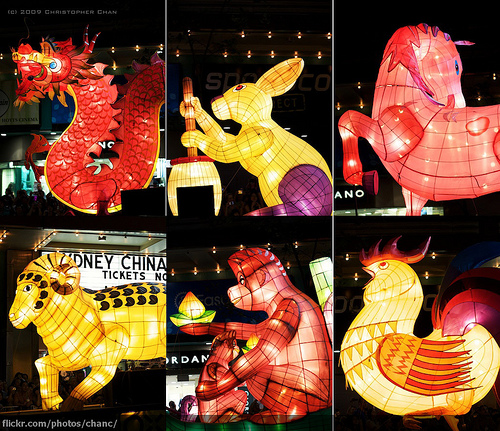Happy New Year
Today marks the celebration of Tet, Vietnamese New Year and Chinese New Year. The image above is taken from a present day celebration of Chinese New Year in Sydney in 2009. However, courtesy of the research of our Acting Senior Archivist, Context and Documentation, Janette Pelosi we are able to take you back in time with an account of a Chinese New Year from 1859.
Thomas Fennell, playwright
One of Janette’s personal research interests is the work of early australian playwrights. Her research into the life of Thomas Fennell, a frustrated and apparently unperformed playwright, led her to uncover this amazing account of a colonial celebration of Chinese New Year. Thomas Fennell, late of the Royal Navy, arrived in Sydney with his wife and six children in 1839[1].
He is known to have written two plays:
- They Are Both Gone Mad or The Cadi and The Cobbler – which has survived in the State Records collection
- The Shipwrecked Merchant, or The Fisherman Rewarded – an earlier play which does not appear to have survived [2].
His early hopes of obtaining government employment in the 1840s depression were disappointed and he was forced to move up country to support his family with work as a labourer[3].
An account of Chinese New Year by Thomas Fennell
He wrote from Bungarie’s Nore, Brisbane Water [ie. Gosford] to the Sydney Morning Herald describing a celebration of Chinese New Year in February 1859.
[Note: This letter may contain words and descriptions that may sadden and distress some Chinese and Aboriginal and Torres Strait Islander people. The language and terms used by the author may reflect an inappropriate attitude due to the historical context in which the letter was created.]
……For some days, towards the close of January, the Chinese at this settlement were observed to be intent upon important business of their own, or what they evidently regarded as such. They erected a large tent and surrounded it with green bowers, but as to the nature of the preparations going on within this enclosure the white settlers were not informed. On Friday, the 2nd instant, however, a deputation from the Celestials waited upon the good people at Mr. Hargrave’s station, and informed them that the following day would be, according to Chinese chronology, the commencement of the new year. They earnestly invited their Anglo-Saxon fellow-settlers, of both sexes, to join them in a friendly celebration of this festival, and for this purpose to honour them with their company at dinner, within the mysterious bower already mentioned.
The invitation was accepted; and, on entering within the enclosure, all were struck with surprise at the magnitude and excellence of the preparations which had been made. The large bush table was covered with a cloth as white as mountain snow, with clean shining plates and bright knives and forks for each guest. The collection of edibles was such as would have satisfied the veriest epicure. Geese, ducks, sucking-pig, pork, ham, tongue, corned beef, and, although last named, not least in importance, a splendid sirloin of the “roast beef of old England,” with a plum pudding to match. Plenty of good ale and porter was also provided to wash these good things down. For the dessert there were not only all the fruits then in season, but a number of excellent confections prepared by the Chinese themselves. The Celestials waited most attentively throughout upon their white guests, and all was harmony. After the removal of the cloth, wines and other liquors were placed upon the table, and the health of her Majesty the Queen was drunk with three times three, a royal salute being at the same time fired by the Chinese – not with cannon, but with their largest sized crackers. These, however, produced a most stunning report. A variety of other toasts were also drunk, and there was a good deal of excellent singing. Among those present was a professional, who had sung with great applause at some of the Royal Theatres, and such melody as was heard on this occasion has perhaps never before floated through an Australian forest. The party was also highly amused by the execution of the ” kangaroo dance,” by an old black woman and her son.
The best order, as well as the best feeling, prevailed throughout, and the guests when they separated and returned to their own homes, were highly delighted with their afternoon’s treat…..[4]
Janette Pelosi and Fiona Sullivan
[1] State Records NSW: Immigration; NRS 5313, Persons on government ships, 1837-39 [4/4780 p.250] Reel 2654.
[2] State Records NSW: Colonial Secretary; NRS 943, Letters to individuals and others, [4/3547] Reel 2295.
[3] State Records NSW: Colonial Secretary; NRS 905, Main series of letters received, 1853 [4/3915] Letter No. 53/3459, Thomas Fennell, Applying for employment, registered 19 April 1853
[4] Sydney Morning Herald, 18 February 1859, p.3 (http://nla.gov.au/nla.news-article13019361)


Margaret Blundell says:
A sequel to the 1859 story described above occurred on Saturday 22nd January 2011 at Toukley (a Central Coast suburb located on part of the former Hargraves farm). On that day the Central Coast Chinese Association held a New Year Celebration to which members of the local community could attend (on the payment of a small fee to cover costs). The large audience was treated to a concert of Chinese music & dance, including a spectacular Lion dance, followed by a meal of chinese style food. While there were no official toasts proposed, the presence of several local & state politicians ensured that more time was devoted to speeches than was really necessary.
Janette Pelosi says:
@Margaret: What a great link between Chinese New Year in 1859 and 2011! The same community spirit remains.